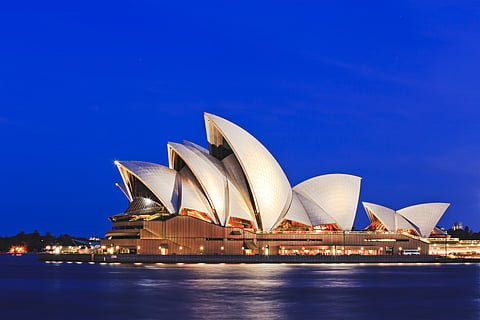
- Destinations
- Experiences
- Stay
- What's new
- Editor’s Picks
- Responsible Tourism
- CampaignsCampaigns
- Subscribe

Australia's most iconic building, the Sydney Opera House, recently celebrated its 50th anniversary. The multi-venue performing arts centre, which officially opened on October 20 1973, after 14 years of construction, is widely regarded as a masterpiece of 20th-century architecture and stands as a symbol of modern Australia.
Architecture: Vision Into Reality
The Sydney Opera House, Australia's crowning jewel, is the brainchild of the visionary Danish architect Jorn Utzon; this architectural wonder emerged victorious from a 1956 international competition sponsored by Joseph Cahill, then-New South Wales Premiere. Utzon's groundbreaking design, chosen from 233 entries, ingeniously fused visual brilliance with practical elements.
The Opera House's iconic roof sails, composed of one million ceramic tiles, showcased not only aesthetic allure but also considerations for reducing heat absorption through clever use of colour and surface texture. Utzon's design went even further by incorporating innovative features to conserve water, drawing its supply from the surrounding sea. His aspiration for a building with a 250-year lifespan defied the norms of his time, where structures were typically expected to endure for only 80 years.
In 2007, UNESCO's recognition of the Sydney Opera House as a World Heritage site elevated its status, honouring its daring and visionary architecture. This accolade underscored the building's unparalleled design, defining it as a masterpiece of 20th-century architecture.
Before the Sydney Opera House or even the city of Sydney existed, the land was known as Tubowgule by the Gadigal people, the area's traditional custodians. The Opera House pays homage to its Indigenous heritage through various symbolic elements. For instance, the fine dining establishment Bennelong derives its name from the Gadigal word for the Sydney harbour area. Notably, the 50th-anniversary celebrations featured a poignant artwork named "Whispers," crafted by Aboriginal artist Megan Cope using local materials such as poles and oyster shells, evoking a powerful tribute to the land's original custodians.
The Opera House isn't merely a destination for tourists; it also embodies personal stories and connections for many locals. Its significance resonates deeply with Sydneysiders like McKellar, who recalls childhood performances and later marked personal milestones within its architectural embrace.
Beyond its architectural and cultural eminence, the Sydney Opera House exemplifies an unwavering commitment to sustainability. It doesn't merely rest on its laurels but actively engages in preserving its original features while constantly reassessing its operations for environmental responsibility. This dedication has earned the Opera House a remarkable 6-Star Green Performance Rating, a rare recognition for a UNESCO World Heritage Site, showcasing its dedication to sustainable practices.
The Sydney Opera House stands not just as an architectural masterpiece but as a living testament to cultural heritage and environmental stewardship. Its allure, both to global visitors and local residents, is a testament to its timeless magnetism and continuous pursuit of excellence, inviting all to experience its captivating blend of history, innovation, and sustainable legacy.
The Information
Timings: Mon-Sun (9 am-5 pm)
For tours and experiences, click here
For tickets, click here
Getting There
The Sydney Opera House can be easily accessed via various modes of transportation. Visitors can reach the Opera House by train through Circular Quay station, a short walk from the site, or opt for ferries across Sydney Harbor that dock at Circular Quay. Bus routes servicing the area and walking from the CBD are additional convenient options. For those driving, parking may be limited and pricey, but nearby parking stations or street parking can be found. Rideshare services like Uber or taxis are also available.
